#september letters book tour
Text



When your wife needs to make sure you get the message 🌹🔥
#brittany snow#Anna Kendrick#i cant breathe#my sendrick heart#september letters book tour#kelly clarkson show
56 notes
·
View notes
Text




BRITTANY'S 'YIN x YANG' LOOKS FOR TODAY SLAYED!
THE MINI TOUR IS DEFINITELY ON.
8 notes
·
View notes
Text
Wonderland
Wonderland is a song about a love that feels so enticing it draws her in against her judgment. Taylor uses Lewis Carroll's Wonderland as a metaphor for love with a famous person and they try to hold on the chaos that ensues from going public. Get a cup of tea, this is long. I feel the lyrics, meaning and context of this song are overlooked because Taylor had a friend who likes the classic novel.



22 March 2011 - Taylor visited an Alice and Wonderland themed store on Portobello Road, London. (2011 timeline)
5 November 2012 - One Direction is on the cover of Wonderland Magazine holding puppies. The article talks about a book deal from a fanfic about Harry, death threats to girlfriends, abuse of their mothers, relationships breaking down due to abuse by fans and absolute ferver about them at that time. It includes the quotes:
"Anyone is welcome to stare into the eyes of Madness" and "The boys show a similar stubbornness when I suggest, perhaps, if they were a little less public about their girlfriends (boybands like Take That, for example, were always encouraged by management to be perennially single in public), then maybe their partners would not have to endure so much attention. “That’s shit,” says Louis. “That means you don’t lead a life that’s real. You wouldn’t be able to go out anywhere publicly with your girlfriend.”
2 December 2012 - a month after the article Harry and Taylor walked in Central Park. They had been on/off in private for months at that point and seemingly together for the last 4 months.
17 November 2014 - Taylor is on the cover of Wonderland Magazine, she talks about 1989 and Twitter Trolls.
In 2015 Taylor indicated that all the songs of romance songs on 1989 were about on person. While Taylor has never said who that person is songs like Style hint. Thank you @cntfightmydemonsthyknowhowtoswim for the shopping photo and timeline help! In her March 15 2013 vanity fair article (the one that said harry chased her for a year before they dated and also pointed mentions she was born in 1989) Taylor said:

Lyric Video
References the book, Harry's eye's and the 1D Wonderland article:
"Anyone is welcome to stare into the eyes of the madness."
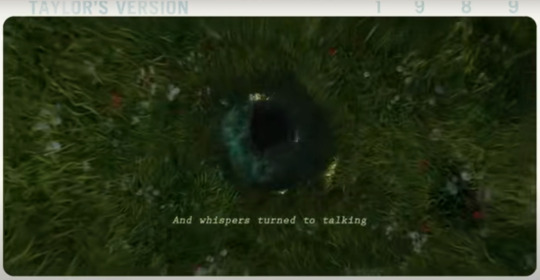
Live Performances
Taylor has only performed it 6 times, each has a reason. When 1989 was release Harry’s IG went black and white and stayed that way for nearly 2 years. He posted a colour photo within a week of each Time this song was played.
May 15, 2015, Las Vegas Rock in Rio, first played. After performing Tenerife Sea with Ed Sheeran. This first performance was 2 days before the 2015 BBMAs when Taylor knew she would be seeing Harry. (Harry colour IG post)
May 20, 2015, Bossier City Louisiana (1989 Tour), on Harry and Taylors anniversary. It was followed by the Clean Speech she referred to the 2015 BBMAs 3 days earlier and 'where you should be' which Harry later referenced in Woman. (Harry colour IG post)
June 6, 2015, Pittsburgh (1989 Tour) - the day after the One Direction Hiatus story first broke. (Harry colour IG post).
June 20, 2015, Cologne, Germany (1989 Tour). Day of Taylors letter to Apple and 1989 not to be on Apple music. (Harry colour IG post)
September 29, 2018, Houston (Reputation Tour) - day after Haylor anniversary of Begin Again Paris weekend
April 21, 2023, Houston on (Eras Tour) Taylor introduced it and said it has a"twisted kind of Alice and Wonderland vibe" day before Peace Ring Anniversary
Original Lyrics
Along with 1989 TV Taylor released the original Wonderland Lyrics 27 October 2023. They are undated. I think it may have been started in 2011 when Taylor was in London and finished for 1989. The original Lyrics further indicate this song is about Harry:
"We danced down hallways, too in love to think straight" rather than" became "So, we went on our way / Too in love to think straight" Hallway's being common theme in Harry and Taylors songs about each other.
"Screaming you're the king and I'm the queen," rather than "All alone, or so it seemed." King/Queen is a common reference Taylor has used to indicate the muse is British. This is also on 1989 in Blank Space: "Stolen kisses, pretty lies, you’re the king, baby, I’m your queen"
"Colors I'd never seen twisting around me" became "I felt your arms twistin' around me." Colours are also a Haylor theme, on 1989 with OOTW: "The rest of the world was black and white / But we were in screaming color.”
"Didn't I tell you don't listen to them?" to "Didn't they tell us don't rush into things?" this reminds me of Slut! "I said it might blow up in your pretty face / I'm not saying do it anyway / But you're going to" because they went public and it did blow up.
"I turned around to find you and you were nowhere to be found / There was screaming and lightning / And I haven't been back since I had to leave you there..." became "I reached for you, but you were gone / I knew I had to go back home / You searched the world for somethin' else." this is similar to I Knew You Were Trouble: "And he’s long gone when he’s next to me", This Love: "And you were just gone and gone, gone and gone" and Blank Space: "Screaming, crying, perfect storms, I can make all the tables turn".
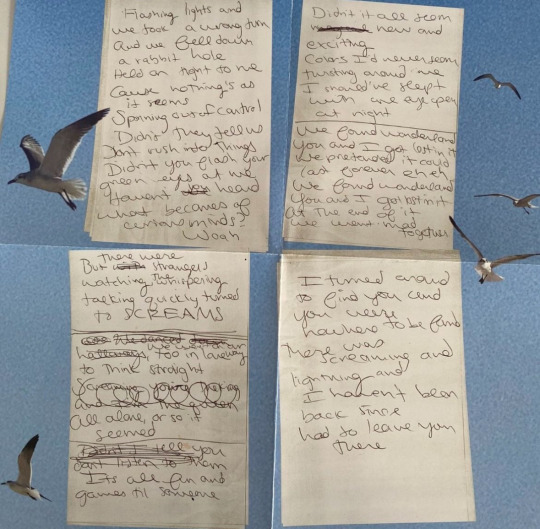
Lyrics
[Verse 1]
Flashing lights
And we took a wrong turn
And we fell down a rabbit hole
You held on tight to me
'Cause nothing's as it seems
And spinning out of control
The first verse sets the scene of a relationship that is in the public eye and two people trying to hold onto their love in chaos. Specifically not a hidden relationship.
Flashing lights - It's easy to overlook how very out of control the fans and paparazzi were about Haylor and One Direction in 2011 - 2013. Having dated in secret for sometime when they did go public the focus was intense. When they dated again it was hidden, which is evident in both of their discographies.
I Know Places: Lights flash and we’ll run for the fences
Is It Over Now?: Flashing lights, oh Lord, let’s fast forward to three hundred takeout coffees later
Paris: Let the only flashing lights be the tower at midnight in my mind
One Directions Perfect "And if you like cameras flashing every time we go out oh yeah"
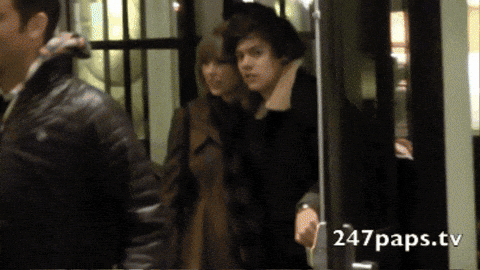
Fell down a Rabbit Hole is similar to IWYW "We're a crooked love in a straight line down"
Trying to hold onto each other in chaos is also in:
Run: "Say you’ll never let them tear us apart and I’ll hold onto you while we run"
New Years Day "You squeeze my hand three times in the back of the taxi"
Dancing with our hands tied "Oh, and you held me close Oh, how was I to know?"
The Archer: Help me hold on to you
Harry for One Direction Story of my Life "The way that I been holdin' on too tight"
Harry for One Direction Olivia "Don't let me go"
[Pre-Chorus]
Didn't they tell us "Don't rush into things"?
Didn't you flash your green eyes at me?
Haven't you heard what becomes of curious minds?
Ooh, didn't it all seem new and exciting?
I felt your arms twistin' around me
I should have slept with one eye open at night
The Pre-Chorus tells of a decision to go public with a previously private relationship. At the time Harry and One Direction were incessantly asked invasive questions about dating, which Harry was increasingly uncomfortable answering. Shortly before 1D provided a list of banned questions which was not well received.
Slut! implies that Harry had wanted to go public and Taylor cautioned against it " Taking your chance / It's a big mistake / I said it might blow up in your pretty face / I'm not saying do it anyway / But you're going to / And if they call me a slut / You know it might be worth it for once"
Harry's green eyes are mentioned in many songs.
[Chorus]
We found Wonderland, you and I got lost in it
And we pretended it could last forever (Eh, eh)
We found Wonderland, you and I got lost in it
And life was never worse, but never better (Eh, eh)
The Chorus encapsulates this relationship, one they are drawn to, see the peril in and proceed anyway because they love it. Taylor has other lyrics that refer to forever not coming true:
Wildest Dreams: Nothing lasts forever, but this is getting good now
Cowboy Like Me: Forever is the sweetest con
False God: We were crazy to think / Crazy to think that this could work / Remember how I said I'd die for you?
Pretending is also a theme, I think this about suspending judgement to stay in a Lavender Haze, or set aside concerns about the potential reputational damage or bullying caused by fans:
I Knew You Were Trouble: "Pretend he doesn’t know that he’s the reason why your drowning"
Wildest Dreams: "Say you’ll see me again even if it’s just pretend"
Delicate: "Sometimes when I look into your eyes, I pretend you’re mine all the damn time"
Death By A Thousand Cuts: "Chandelier’s still flickering here ‘cause I can’t pretend it’s okay when it’s not"
Paris: "Stumble down pretend alleyways, cheap wine, make believe it’s champagne"
[Post-Chorus]
(Eh, eh, eh, eh, eh, eh)
In Wonderland x3
The post chorus Eh's sound so similar to Rihanna's "Under my umbrella, ella, ella, eh, eh, eh" which is actually similar in theme, Umbrella is about a famous couple being there for each other, Wonderland is feeling like that didn't happen.
In the period One Direction was incessantly asked for a celebrity crush (while he was actually dating an exceptional famous dream girl) Harry often said Rihanna, if he answered. Rihanna was a safe choice, she wasn't single, she has spoken highly of Harry. Also she sat in front of him at the infamous 2013 VMAs.
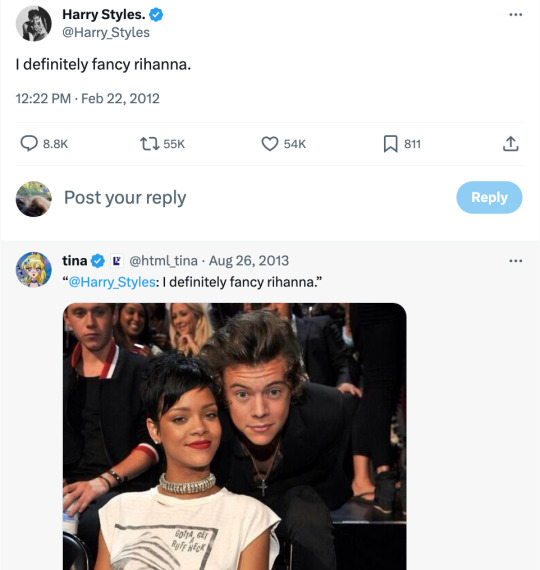
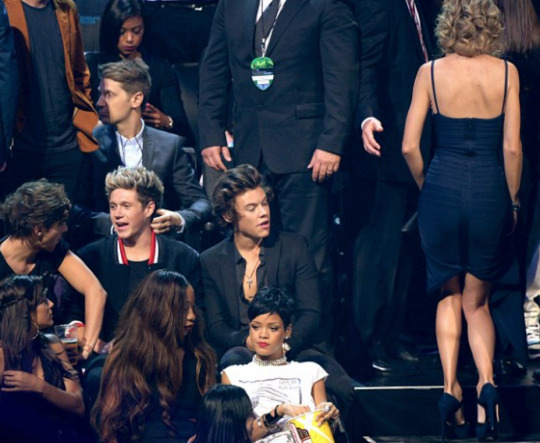
[Verse 2]
So, we went on our way
Too in love to think straight
All alone, or so it seemed
But there were strangers watchin'
And whispers turned to talkin'
And talking turned to screams, oh
Fame and focus of people outside the relationship is a theme. I can't repeat enough how much this song is about a public relationship:
Dancing with our hands tied "People started talkin', puttin' us through our paces" and
I know places - "Somethin' happens when everybody finds out / See the vultures circling, dark clouds / Love's a fragile little flame, it could burn out / It could burn out" and "I can hear them whisper as we pass by, It's a bad sign, bad sign"
…Ready For It?: Touch me and you’ll never be alone
So It Goes…: But when you get me alone, it’s so simple
Harry for One Direction Where do Broken Hearts Go: "Mind is runnin' in circles of you and me / Anyone in-between is the enemy"
[Pre-Chorus]
Didn't they tell us "Don't rush into things"?
Didn't you flash your green eyes at me?
Didn't you calm my fears with a Cheshire cat smile?
Ooh, didn't it all seem new and exciting?
I felt your arms twistin' around me
It's all fun and games 'til somebody loses their mind
But darling
The reference of a Cheshire Cat smile is a double meaning, both referring to Harry's smile and where he grew up, Cheshire, England. Lewis Carroll, author of Alice in Wonderland, was also born in Cheshire. Calm my fears similar to the line in NYD “squeeze my hand”
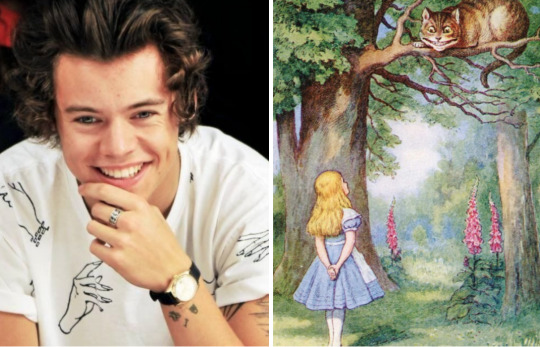
[Bridge]
I reached for you, but you were gone
I knew I had to go back home
You searched the world for somethin' else
To make you feel like what we had
And in the end, in Wonderland, we both went mad
Oh
The song ends on a sad note, Taylor realises the relationship is too much for her so she gives it up. Her muse can't replace her and they never get over it. From Slut! and Say Don't Go in the 1989 Vault Taylor wanted more assurance in the chaotic storm of them going public. From Harry's TBSL and Little Freak we can infer that he wasn't ready for it, 19 and too famous too quickly.
Reached for you but you were gone
Message In A Bottle: I’m reaching for you, terrified
I Knew You Were Trouble: And he’s long gone when he’s next to me
I Know Places: Just grab my hand and don’t ever drop it
New Romantics: Please take my hand and please take me dancing
Willow: I’m begging for you to take my hand, wreck my plans, that’s my man
Harry's As it was: I want you to hold out the palm of your hand / Why don't we leave it at that?
You searched the world for something else
Is it over now? "You search in every model's bed for somethin' greater, baby"
Harry's As it was: When everything gets in the way / Seems you cannot be replaced / And I'm the one who will stay, oh
We both went mad: the song ends on 'we both went mad' which is a double meaning of having lost themselves in this relationship and the Cheshire Cat saying "we're all mad here. I'm mad. You're mad." in Alice in Wonderland. Madness is a theme in Harry and Taylors songs about each other:
Blank Space "Magic, madness, heaven, sin" and "They'll tell you I'm insane"
Say Don’t Go: "The waiting is a sadness fading into madness"
IDWLF "Baby, baby, I feel crazy Up all night, all night and every day"
Hit's Different "Or have they come to take me away? To take me away"
Harry for One Direction If I could Fly "I've been going out of my mind (I feel it I feel it) Know that I'm just wasting time"
Harry's Kiwi "She's driving me crazy, but I'm into it (Oh)
21 notes
·
View notes
Note
About Paul claiming to have met Yoko ‘first’; maybe he means Yoko reached out to him one on one before John? (to his knowledge anyway). If she was looking for a sponsor he may have seemed more available than John was in terms of first impressions at least.
Yes, I think that’s what he’s saying. But I guess the important part isn’t ‘Yoko knocked on my door first’ - because who cares? - but I, Paul McCartney, sent her to meet John and that’s how they first got connected and they have been purposely lying about their first meeting ever since. That seems to be the implication. And I guess that could have happened.
I can think of three scenarios, but I am sure there are more possibilities:
Sometime in July up until 11 August (Beatles leave for the US tour) or between 31 August and 5 September (between the tour and John leaving for filming) - everything happens as Paul said. He and Yoko meet, Yoko gets sent to John and they hook up. Or for some reason it’s not important enough for her to make the drive, or she does and John’s just not home, so the meeting doesn’t happen. It never comes up in a conversation between Paul and John/Yoko, so he honestly doesn’t know either way.
This very much depends on if Yoko was actually in London at those times. All I could find was that she came to England because she was invited to the Destruction in Art symposium. That began at 9 September but her performance was later, on 28 September. So that's the date we definitely know she was there and, as far as I have seen, there is no mention of her being at or having any events in England earlier the year. 🤷
Yoko definitely is in London in September/October. She goes to Paul’s some time during those months. Paul isn’t in the mood, or just isn’t interested and to get rid of her, he sends her to John’s place, knowing full well that John’s out of the country and no meeting could have happened. That would mean he tells the story as a half-truth, trying to involve himself more into the events and to hurt John and Yoko’s credibility at the same time.
Paul remembers the correct circumstances but at the wrong time and Yoko coming to his door happened later. What you are saying about first impressions is why I thought it made the most sense after Yoko and Paul got talking at the Claes Oldenburg opening. There's a Yoko quote about meeting Paul there (I don't remember where to look for it), but I'm pretty sure it sounded like a first time meeting. He looked like an art student and they had a nice conversation. If he was his usual charming self, talking about how much he liked the avantgarde, how he's a musician etc., I can see Yoko thinking that he would be ideal to approach for some music sheets for John Cage. And that could be late November. I don't think being wrong about a few weeks 20 years after it happened, is very unlikely.
Without actually seeing the letters from Yoko to John Cage (maybe they could give a date and some context), it also sounds like her asking for the lyrics happened after she got to know The Beatles a bit:
"The best-known materials in the Cage Collection—framed copies hang in the music library on public view—are lyric sheets from the Beatles. Yoko Ono, a friend of Cage’s, wanted to introduce him to the work of the Beatles, who shared his interest in silence, chance, and tape music. For the Notations book, she got him “scores” for seven of their songs—the Beatles didn’t write notated music, something Ono had to explain to Cage in a letter, so the scores were simply lyrics. John Lennon gave her six manuscripts from Revolver, including “Eleanor Rigby” and “Yellow Submarine,” and Ono later convinced Paul McCartney to give her the colorful manuscript for “The Word” (from Rubber Soul). Cage included a black-and-white scan of “The Word” in Notations, the book’s only piece of pop music by any standard." https://chicagoreader.com/music/john-cages-treasures-are-hiding-in-plain-sight/
#thanks anon for the ask#and sorry the answer comes so late#behind a cut because it's#thoughts in progress
8 notes
·
View notes
Text
Last September, while working at his desk in Philadelphia, Samuel R. Delany experienced a mysterious episode that he calls “the big drop.” His vision faded for about three minutes, and he felt his body plunge, as if the floor had fallen away. When he came to, everything looked different, though he couldn’t say exactly how. Delany, who is eighty-one, began to suspect that he’d suffered a mini-stroke. His daughter, Iva, an emergency-room physician, persuaded him to go to the hospital, but the MRI scans were inconclusive. The only evidence of a neurological event was a test result indicating that he had lost fifteen per cent of his capacity to form new memories—and a realization, in the following weeks, that he was unable to finish his novel in progress, “This Short Day of Frost and Sun.” After publishing more than forty books in half a century, the interruption was, he told me, both “a loss and a relief.”
For years, Delany has begun most days at four o’clock in the morning with a ritual. First, he spells out the name Dennis, for Dennis Rickett, his life partner. Next, he recites an atheist’s prayer, hailing faraway celestial bodies with a litany inspired by the seventeenth-century philosopher Baruch Spinoza: “Natura Naturans, system of systems, system of fields, Kuiper belt, scattered disk, Oort cloud, thank you for dropping me here.” Finally, he prepares oatmeal, which he faithfully photographs for the friends and fans who follow him on Facebook. Every so often, when the milk foams, he sees Laniakea—the galactic supercluster that’s home to Earth.
In the stellar neighborhood of American letters, there have been few minds as generous, transgressive, and polymathically brilliant as Samuel Delany’s. Many know him as the country’s first prominent Black author of science fiction, who transformed the field with richly textured, cerebral novels like “Babel-17” (1966) and “Dhalgren” (1975). Others know the revolutionary chronicler of gay life, whose autobiography, “The Motion of Light in Water” (1988), stands as an essential document of pre-Stonewall New York. Still others know the professor, the pornographer, or the prolific essayist whose purview extends from cyborg feminism to Biblical philology.
There are so many Delanys that it’s difficult to take the full measure of his influence. Reading him was formative for Junot Díaz and William Gibson; Octavia Butler was, briefly, his student in a writing workshop. Jeremy O. Harris included Delany as a character in his play “Black Exhibition,” while Neil Gaiman, who is adapting Delany’s classic space adventure “Nova” (1968) as a series for Amazon, credits him with building a critical foundation not only for science fiction but also for comics and other “paraliterary” genres.
Friends call him Chip, a nickname he gave himself at summer camp, in the eleventh year of a life that has defied convention and prejudice. He is a sci-fi child prodigy who never flamed out; a genre best-seller widely recognized as a great literary stylist; a dysgraphic college dropout who once headed the Department of Comparative Literature at the University of Massachusetts, Amherst; and an outspokenly promiscuous gay man who survived the aids crisis and has found love, three times, in committed, non-monogamous relationships. A story like Delany’s isn’t supposed to be possible in our society—and that, nearly as much as the gift of his writing, is his glory.
It took several months to persuade him to meet. Delany has polemicized against the face-to-face interview, reasoning that writers, who constitute themselves on the page, ought to be questioned there, too. He warned in an e-mail that a visit would be a waste of time, offering instead a tour of his “three-room hovel” via Zoom: “No secret pile will be left unexplored.” Yet a central theme in his work is “contact,” a word he uses to convey all the potential in chance encounters between human beings. “I propose that in a democratic city it is imperative that we speak to strangers, live next to them, and learn how to relate to them on many levels, from the political to the sexual,” he wrote in “Times Square Red, Times Square Blue” (1999), a landmark critique of gentrification which centered on his years of cruising in the adult theatres of midtown Manhattan.
His novels, too, turn on the serendipity of urban life, adopting the “marxian” credo that fiction is most vital when classes mix. Gorgik, a revolutionary leader in Delany’s four-volume “Return to Nevèrÿon” series, rises from slavery to the royal court in an ancient port city called Kolhari, where he learns that seemingly centralized “power—the great power that shattered lives and twisted the course of the nation—was like a fog over a meadow at evening. From any distance, it seemed to have a shape, a substance, a color, an edge. Yet, as you approached it, it seemed to recede before you.”
In January, Delany finally allowed me to visit him at the apartment complex that he now rarely leaves. A hulking beige structure near the Philadelphia Museum of Art, it looms like a fortress over the row houses of the Fairmount. I crossed a lobby the length of a ballroom and rode the elevator to the fourth floor. As I walked down the hallway, I noticed a small man behind a luggage trolley taking my picture. It was Delany, smiling in welcome with his lively brown eyes and strikingly misaligned front teeth.
[A Delightful portrait of my favorite Science Fiction writer]
21 notes
·
View notes
Text
My 2023 Recap!!
January:
▫️got a 2nd job that’s a WFH job!
▫️went to the library
▫️139 day streak for duo French!
Febuary:
▫️actually started my new job!
▫️read 3 books! (The first three in Shadow and Bone series!)
▫️169 days for my French streak!
▫️went to the library more!
March:
▫️made some yearly goals
▫️189 French streak!
▫️started new workout plan!
▫️started my Saturn Return 🪐
▫️learned how to use printer at the library! (Game changer for me!)
▫️got a new hairdresser and haircut!
April:
▫️216 for French streak!
▫️follow up for anxiety program referral.
▫️continued workout plan!
▫️finished reading another book!
▫️started paint-by-number
▫️started growing cucumbers!
May:
▫️wrote my resignation letter for my first job.
▫️quit one of my jobs!
▫️went to a surprise party!
▫️finished majority of my YT script
▫️244 for French streak!
▫️survived a cold
▫️bought gel plate for art
▫️got $20 for completing surveys
▫️bought a backdrop + tripod
June:
▫️had fun at one of my friends b-day party!
▫️worked my last day at my first job.
▫️made some art with the gel plate!
▫️another $20 for doing surveys
▫️spending a lot less on transportation and ordering out because of my job.
▫️worked more hours at my WFH job.
▫️269 french streak!
▫️bought the book “the Artists way”
▫️cooking more!
▫️found a scam in my bank account!
July:
▫️still growing tomatoes and cucumbers!
▫️continued workout plan!
▫️cooking and making food more!
▫️deleted my Flo app to track more on paper!
▫️saving more money!
▫️saw the Barbie movie with some friends!
▫️bought BEYONCÉ tickets and planned a whole trip!
▫️290 for french streak!
August:
▫️finally got reimbursed for the scam in my bank account
▫️planned my outfit for the RENAISSANCE TOUR! (Are you ready?! SHAWHAM!)
▫️finished a sewing project
▫️did a mini photoshoot for my sewing project
▫️309 days for french streak
▫️made pasta salad!
▫️got a new phone!
September:
▫️329 french streak!
▫️went to Vancouver by myself!
▫️had an overall successful trip to and from Vancouver!
▫️went to the Blodel conservatory in the van Dusen Gardens in Vancity!
▫️WENT TO BEYONCÉ!!! 🪩
▫️got my picture taken for a CBC article!
▫️got Beyonce merch!
▫️went to the aquarium!
▫️found a real fur scarf at the thrift store!
▫️had a going away party with former co-workers!
▫️finished a journal & started a new one!
▫️had movie night with a friend!
October:
▫️347 French streak!
▫️several Halloween movie night with my friends!
▫️bought two new journals!
▫️bought new headphones from warranty!
▫️bought my own candles and birthday balloons
▫️cleaned out a lot of my Twitter likes and hopefully deleting soon!
▫️got a call from a psychotherapist to determine next steps for therapy.
November:
▫️cleaned out two shelves in my room and reorganized a bunch of stuff!
▫️cleaned/reorganized desk and bought a desk mat!
▫️1 year french streak!
▫️cleaned out mini fridge and tea area!
▫️got a gift card from my work!
▫️got a refund from an Astro reading I didn’t get earlier in the year!
▫️enjoyed Kurtis Conner special! (Damn he’s funny!)
▫️started Christmas shopping!
▫️finished one of my yearly goals which was Reading 10 books!
▫️printed more from library like my workout sheets and debt tracker!
December:
▫️380 days for French streak!
▫️went to see the Renaissance movie!!
▫️finished Christmas shopping!
▫️made a friend a bucket hat!
▫️turned 29!
▫️got myself two bras and a sweater!
▫️found an Oleg Cassini wool skirt set from the 60s at the thrift store!
▫️started holidays with my WFH job!
▫️got some Oh doughnuts for my birthday!
▫️got most of the stuff I wanted/needed for Christmas!
#2023#new year#2023 recap#goals#list#learning French#books#reading#june and July were busy months#personal#job#wfh jobs#Beyoncé#travel#trip#friends#events#money#sewing#let’s see what next year brings#happy new year
5 notes
·
View notes
Note
3 9 & 23 :)
3. Favorite musical artist / group you started listening to this year?
i didnt rly get that into chappell roan until this year and then she slayedddd so hard :)
9. Best month for you this year?
i think it HAS to be march bc even with the hard parts it gave me some of the most special lifelong memories ever... my chemical romance on tour forever baby. second would be september.
23. If you could send a message to yourself back on the first day of the year, what would it be?
Um before you spend your entire time in osaka crying uncontrollably be aware that you are seeing them next year too. dont bother writing cover letters the universe will give you whatever job you're meant to have. do not book the atlantic city marriott hotel for adjacent fest or you will spend three months fighting with them for the $300 they owe you. and get excited for gerard way skirt.
5 notes
·
View notes
Text
Saints&reading: Tuesday, September 5, 2023
august 23 _september 5
THE PRIESTMARTYR IRENAEUS, BISHOP OF LYONS (Gaul_202)
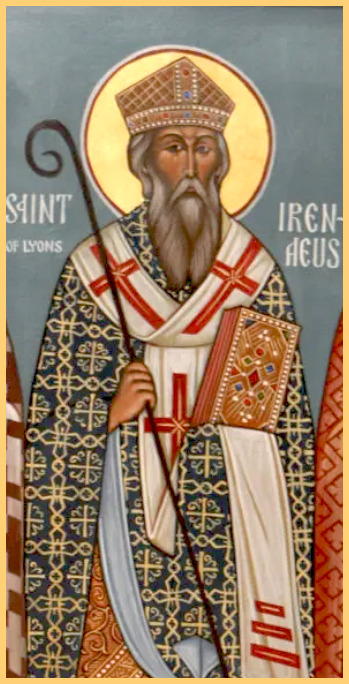
The Hieromartyr Irenaeus, Bishop of Lyons, was born in the year 130 in the city of Smyrna (Asia Minor). He received there the finest education, studying poetics, philosophy, rhetoric, and the rest of the classical sciences considered necessary for a young man of the world.
His guide in the truths of the Christian Faith was a disciple of the Apostle John the Theologian, Saint Polycarp of Smyrna (February 23). Saint Polycarp baptized the youth, and afterwards ordained him presbyter and sent him to a city in Gaul then named Lugdunum [the present day Lyons in France] to the dying bishop Pothinus.
A commission was soon entrusted to Saint Irenaeus. He was to deliver a letter from the confessors of Lugdunum to the holy Bishop Eleutherius of Rome (177-190). While he was away, all the known Christians were thrown into prison. After the martyric death of Bishop Pothinus, Saint Irenaeus was chosen a year later (in 178) as Bishop of Lugdunum. “During this time,” Saint Gregory of Tours (November 17) writes concerning him, “by his preaching he transformed all Lugdunum into a Christian city!”
When the persecution against Christians quieted down, the saint expounded upon the Orthodox teachings of faith in one of his fundamental works under the title: Detection and Refutation of the Pretended but False Gnosis. It is usually called Five Books against Heresy (Adversus Haereses).
At that time there appeared a series of religious-philosophical gnostic teachings. The Gnostics [from the Greek word “gnosis” meaning “knowledge”] taught that God cannot be incarnate [i.e. born in human flesh], since matter is imperfect and manifests itself as the bearer of evil. They taught also that the Son of God is only an outflowing (“emanation”) of Divinity. Together with Him from the Divinity issues forth a hierarchical series of powers (“aeons”), the unity of which comprise the “Pleroma”, i.e. “Fullness.” The world is not made by God Himself, but by the aeons or the “Demiourgos,” which is below the “Pleroma.”
In refuting this heresy, championed by Valentinus, Saint Irenaeus presents the Orthodox teaching of salvation. “The Word of God, Jesus Christ, through His inexplicable blessedness caused it to be, that we also, should be made that which He is ... ,” taught Saint Irenaeus. “Jesus Christ the Son of God, through exceedingly great love for His creation, condescended to be born of a Virgin, having united mankind with God in His own Self.” Through the Incarnation of God, creation becomes co-imaged and co-bodied to the Son of God. Salvation consists in the “Sonship” and “Theosis” (“Divinization”) of mankind.
In the refutation of another heretic, Marcian, who denied the divine origin of the Old Testament, the saint affirms the same divine inspiration of the Old and the New Testaments: “It is one and the same Spirit of God Who proclaimed through the prophets the precise manner of the Lord’s coming,” wrote the saint. “Through the apostles, He preached that the fulness of time of the filiation had arrived, and that the Kingdom of Heaven was at hand.”
The successors of the Apostles have received from God the certain gift of truth, which Saint Irenaeus links to the succession of the episcopate (Adv. Haer. 4, 26, 2). “Anyone who desires to know the truth ought to turn to the Church, since through Her alone did the apostles expound the Divine Truth. She is the door to life.”
Saint Irenaeus also exerted a beneficial influence in a dispute about the celebration of Pascha. In the Church of Asia Minor, there was an old tradition of celebrating Holy Pascha on the fourteenth day of the month of Nisan, regardless of what day of the week it happened to be. The Roman bishop Victor (190-202) forcefully demanded uniformity, and his harsh demands fomented a schism. In the name of the Christians of Gaul, Saint Irenaeus wrote to Bishop Victor and others, urging them to make peace.
After this incident, Saint Irenaeus drops out of sight, and we do not even know the exact year of his death. Saint Gregory of Tours, in his Historia Francorum, suggests that Saint Irenaeus was beheaded by the sword for his confession of faith in the year 202, during the reign of Severus.
The Apostle and Evangelist John the Theologian, Saint Polycarp of Smyrna, and Saint Irenaeus of Lyons are three links in an unbroken chain of the grace of succession, which goes back to the Original Pastor, our Lord Jesus Christ Himself.
In his old age, Saint Irenaeus wrote to his old friend the priest Florinus: “When I was still a boy, I knew you... in Polycarp’s house.... I remember what happened in those days more clearly than what happens now.... I can describe for you the place where blessed Polycarp usually sat and conversed, the character of his life, the appearance of his body, and the discourses which he spoke to the people, how he spoke of the conversations which he had with John and others who had seen the Lord, how he remembered their words, and what he heard from them about the Lord ... I listened eagerly to these things, by the mercy of God, and wrote them, not on paper, but in my heart.”
Source: Orthodox Church in America_OCA
HIEROMARTYR POTHINUS, BISHOP OF LYONS (Gaul_177)
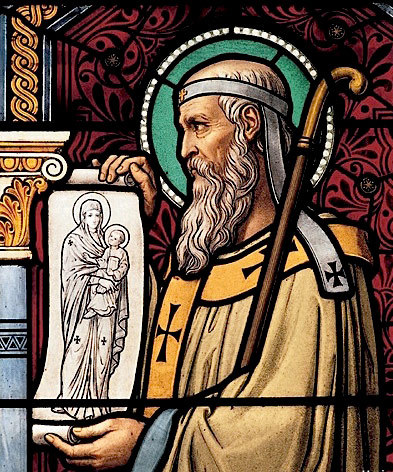
The Holy Polycarp (February 23) sent Pothinus from Asia Minor to spread the Gospel in Gaul. He brought many there to faith in Christ, and became the first bishop of Lyons. During a persecution of Christians Pothinus, who was then ninety years old, was brought before the proconsul, who asked him 'Who is the Christian God?' Pothinus answered 'You will find out, if you are worthy.' He was beaten fiercely with staves and stones, then thrown in prison, where he died of his injuries.
youtube


PHILIPPIANS 2:5-11
5 Let this mind be in you which was also in Christ Jesus, 6 who, being in the form of God, did not consider it robbery to be equal with God, 7 but made Himself of no reputation, taking the form of a bondservant, and coming in the likeness of men. 8 And being found in appearance as a man, He humbled Himself and became obedient to the point of death, even the death of the cross. 9 Therefore God also has highly exalted Him and given Him the name which is above every name, 10 that at the name of Jesus every knee should bow, of those in heaven, and of those on earth, and of those under the earth, 11 and that every tongue should confess that Jesus Christ is Lord, to the glory of God the Father.
MARK 4:24-34
24 Then He said to them, "Take heed what you hear. With the same measure you use, it will be measured to you; and to you who hear, more will be given. 25 For whoever has, to him more will be given; but whoever does not have, even what he has will be taken away from him. 26 And He said, "The kingdom of God is as if a man should scatter seed on the ground, 27 and should sleep by night and rise by day, and the seed should sprout and grow, he himself does not know how. 28 For the earth yields crops by itself: first the blade, then the head, after that the full grain in the head. 29 But when the grain ripens, immediately he puts in the sickle because the harvest has come. 30 Then He said, "To what shall we liken the kingdom of God? Or with what parable shall we picture it? 31 It is like a mustard seed which, when it is sown on the ground, is smaller than all the seeds on earth; 32 but when it is sown, it grows up and becomes greater than all herbs, and shoots out large branches, so that the birds of the air may nest under its shade. 33 And with many such parables He spoke the word to them as they were able to hear it. 34 But without a parable He did not speak to them. And when they were alone, He explained all things to His disciples.
#orthodoxy#orthodoxchristianity#easternorthodoxchurch#originofchristianity#spirituality#holyscriptures#gospel#bible#wisdom#saints#Youtube
4 notes
·
View notes
Text
A Visit to the Kwame Nkrumah Memorial Park

If you are looking for a place to learn about the history and culture of Ghana, then you should definitely visit the Kwame Nkrumah Memorial Park in Accra. This park is not only a beautiful and serene place to relax, but also a tribute to the life and legacy of Ghana's first President and Pan-Africanist, Dr. Kwame Nkrumah.
Who was Kwame Nkrumah?
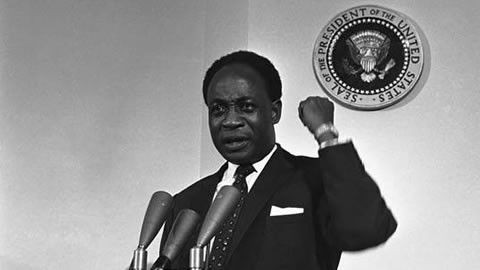
Kwame Nkrumah was born on September 21, 1909 in Nkroful, a small town in the Western Region of Ghana. He was a teacher, a journalist, a politician, and a visionary leader who fought for the independence and unity of Ghana and Africa. He led the Gold Coast (now Ghana) to become the first sub-Saharan African country to gain independence from British colonial rule on March 6, 1957. He became the Prime Minister of Ghana and later the President of the Republic. He also championed the cause of African unity and co-founded the Organization of African Unity (now African Union) in 1963. He was overthrown by a military coup in 1966 while he was on a peace mission in Vietnam. He died in exile in Bucharest, Romania on April 27, 1972.
What can you see at the Kwame Nkrumah Memorial Park?
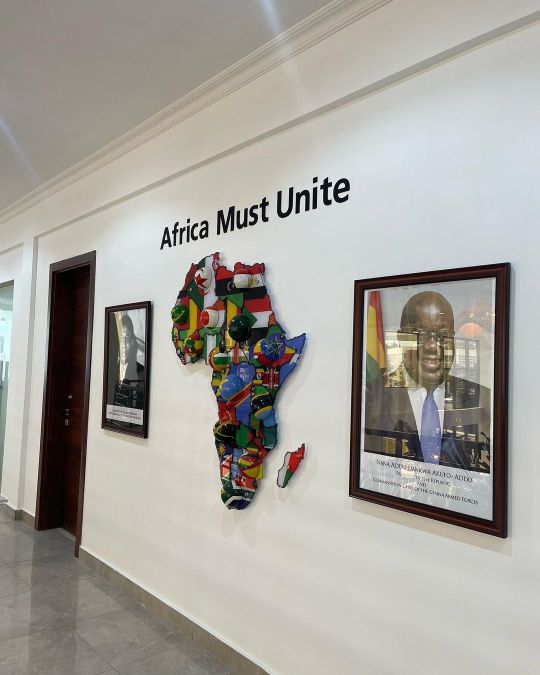
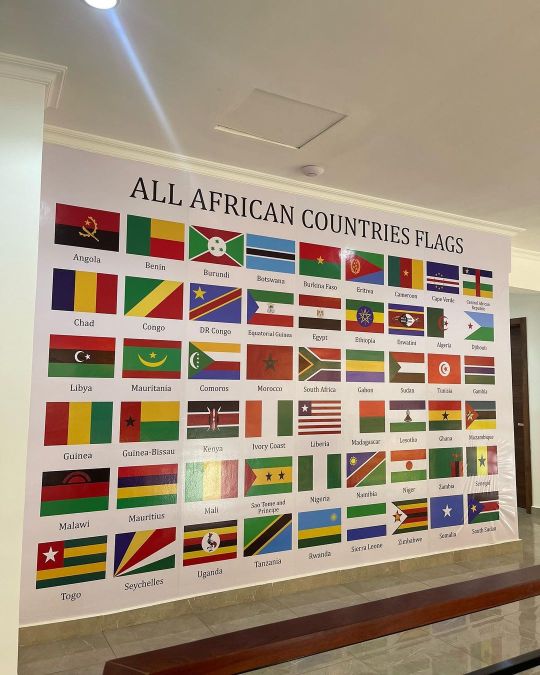
The Kwame Nkrumah Memorial Park covers an area of about five acres and is located on the site of the former British colonial polo grounds, where Nkrumah declared Ghana's independence in 1957. The park consists of three main attractions: the mausoleum, the museum, and the statue.

- The mausoleum is a marble structure that houses the mortal remains of Nkrumah and his wife Fathia Nkrumah. It is designed to resemble an upside-down sword, which is a symbol of peace in Akan culture. The mausoleum is surrounded by water, which represents life. A skylight at the top illuminates the grave, which is marked by a simple marble slab.
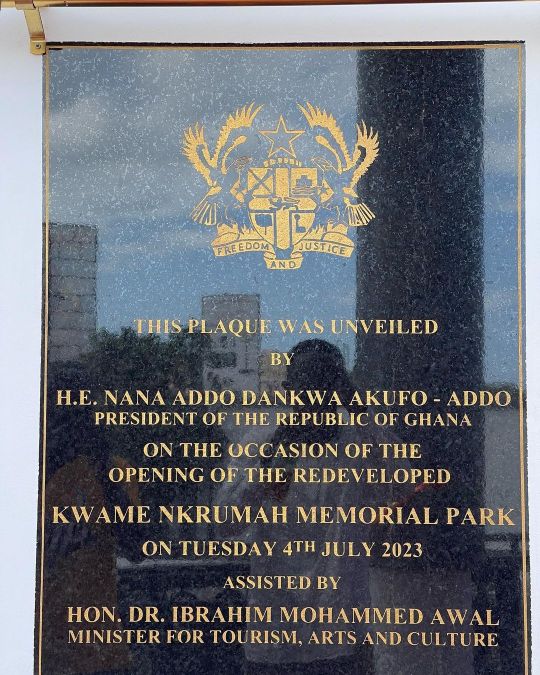
- The museum is an underground building that displays various objects and documents related to Nkrumah's life and achievements. You can see his personal belongings, such as his clothes, books, pens, glasses, and shoes. You can also see his awards, medals, photographs, letters, speeches, and publications. The museum also has audio-visual exhibits that show Nkrumah's speeches and interviews.
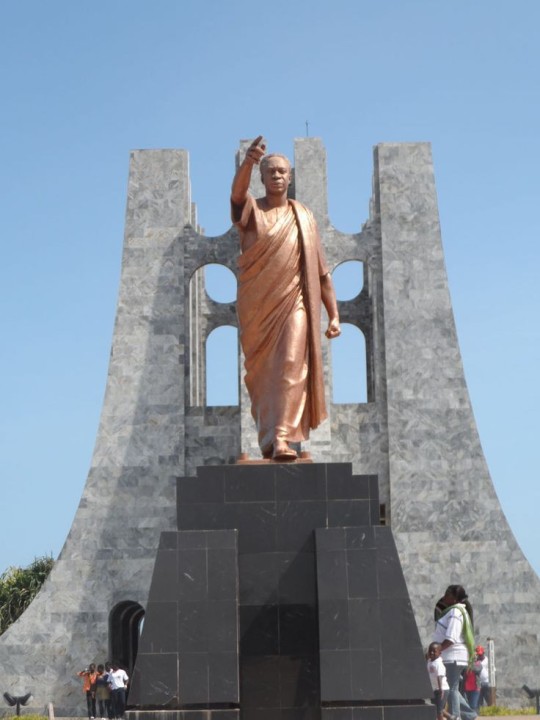
- The statue is a bronze sculpture that depicts Nkrumah standing tall and waving to the crowd. It is placed on a pedestal that bears his famous quote: "Seek ye first the political kingdom and all other things shall be added unto you". The statue faces the Independence Square, where Nkrumah delivered his historic speech on March 6, 1957.
Why should you visit the Kwame Nkrumah Memorial Park?

The Kwame Nkrumah Memorial Park is more than just a tourist attraction. It is a place of inspiration, education, and reflection. By visiting the park, you can:
- Learn about the history of Ghana and Africa from a different perspective.
- Appreciate the vision and courage of Nkrumah and his colleagues who fought for freedom and dignity.
- Understand the challenges and opportunities that Ghana and Africa face today.
- Celebrate the achievements and contributions of Nkrumah and other African leaders to humanity.
- Honor the memory and legacy of Nkrumah and his wife Fathia.
How can you visit the Kwame Nkrumah Memorial Park?

The Kwame Nkrumah Memorial Park is open from Monday to Sunday from 10:00 am to 5:00 pm. The entrance fee is 10 Ghana cedis for adults and 5 Ghana cedis for children. You can also book a guided tour for an additional fee.
The park is located in downtown Accra, opposite the old Parliament House (now CHRAJ). You can easily access it by public transport or taxi. You can also walk from other nearby attractions, such as the Independence Square, the Black Star Square, and the Accra Arts Centre.
The park has a souvenir shop where you can buy books, postcards, T-shirts, and other items related to Nkrumah. It also has a cafeteria where you can enjoy some snacks and drinks.
What are you waiting for?

The Kwame Nkrumah Memorial Park is a must-see destination for anyone who wants to experience Ghana's rich history and culture. It is also a place where you can pay your respects to one of Africa's greatest sons and daughters.
So what are you waiting for? Plan your visit today and discover why Kwame Nkrumah is still relevant and revered in Ghana and beyond.
Sources:
¹: [Kwame Nkrumah Mausoleum - Wikipedia]
²: [Kwame Nkrumah Memorial Park – Visit Ghana]
³: [Kwame Nkrumah Memorial Park (KNMP) Ghana – Accra, Ghana]
https://www.knmp.site/
⁴: [Akufo-Addo to commission redeveloped Kwame Nkrumah memorial park on Tuesday]
#Kwame Nkrumah Memorial Park#Ghana#history#culture#visit#Dr. Kwame Nkrumah#first President#Pan-Africanist#mausoleum#museum#statue#marble structure#remains#peace#life#objects#documents#audio-visual exhibits#personal belongings#awards#photographs#political kingdom#perspective#freedom#challenges#opportunities#Africa#achievements#contributions#humanity
2 notes
·
View notes
Text
Because I am not content with boring everyone in my actual vicinity - this week I’ve been working on Brother Martin and omg I think I’ve finally found him!
Born Walter Taylor Bell in 1846, after the early death of his mother he grew up with his father, younger brother, and paternal grandmother at her pub (The Cat and Fiddle) on Botolph Street in Norwich. When Ignatius arrived in 1864 Walter was 17 and working as a draper’s assistant.
According to Ignatius the lad begged and pleaded to be admitted to the noviciate. Walter claimed Ignatius reeled him in, so successfully he actually converted from Catholicism to become Brother Martin of the Anglican Order of St. Benedict in June 1864.
Walter did not get on particularly well with the other Brothers. At some point in September the Rev. Hillyard refused to administer the sacrament to him as penance for breaking his vow of obedience - he had threatened to punch another Brother in the face that Friday morning.
After Augustine fled the monastery in mid-September, Ignatius went on a lecture tour in the midlands with Brother Brannock, leaving Brother Dunstan in charge as Prior. Dunstan was just 17 like Walter, the son of a Somerset policeman who would later serve jail time for theft, and when Walter read a copy of the Penny Post without permission Dunstan gave him over 1000 paternosters to say in addition to 17 hours worth of lines to write. (As the London Telegraph commented, it was not a matter of astonishment that Walter’s patience broke down.)
Walter quit the Order in a flounce, sending three letters to Ignatius’ biggest detractors - the Norfolk News - detailing what a sham it all was. But. Only one letter had been printed when (if you believe Ignatius’ account) Walter knelt before his saviour and begged ‘with tears in his eyes’ to be readmitted to the monastery. Ignatius had him grovel on his knees during a service at St. Lawrence’s (the Norwich Argus apparently devoted a few columns to it but I haven’t yet been willing to pay for scans...) and duly reinstated him.
The Norfolk News begrudgingly agreed not to print the other two letters and, over the next few weeks, Walter’s credibility was systematically destroyed by Ignatius. Walter claimed he had been locked in the monastery and not allowed out. Ignatius claimed this was the most ugly slander. Walter’s father demanded to see his son - Ignatius said it was Walter who refused to see him. At this distance it’s kind of hard to pinpoint blame but, given later accounts from Llanthony, it would be entirely inkeeping for Ignatius to all but keep the miscreant prisoner - and make them out to be a compulsive liar if they dared complain about it.
Walter, however, was no Sister Mary Agnes. He slipped the keys, unlocked the back door in readiness, then when he was sent to ring the bells for service he stole some street clothing and all the takings from the collection plate before making his get away!
The Rev. Ousely reported him to the police, and he returned the clothing on the Monday evening. Letters flew back and forth in the local press over the issue of the money for weeks afterwards. Ignatius also claimed that Walter had sat for a photograph in his monkish robes and was selling them for profit....
After that everything went quiet for a while. Probably because Walter was getting ready to emigrate to the USA in 1868 where he married Jennie Barret in Brooklyn and had three daughters in New Rochelle. There he became leader of the Huguenot Association Lodge No.46 and wrote a book on its history. So far the last reference I’ve found before his death in 1918 is a newspaper article from 1915, when an original stove given to Thomas Paine by Benjamin Franklin - and latterly belonging to Walter - was restored to the Thomas Paine Cottage Museum.
The picture is tiny but, as best as I can make out, the seated guy on the right is Walter! :D

2 notes
·
View notes
Text
Speaking of such times, I looked up an incident mentioned in passing in the book I'm reading and I thought some of you might like to learn about it too.
Robert Kwami, a representative of the Protestant Ewe-Church, had come to Germany in summer 1932. He was invited by the Norddeutsche Missionsgesellschaft in order to hold a lecture tour with sermons in Northern Germany[1] to inform the German people about Christianity in the former German colony of Togoland and to collect donations to support the young African church. Donations had been scarce in the age of depression. 60 events had been planned, but due to the great public interest 150 lectures and sermons were carried out in 82 towns in Lippe, East Frisia, the County of Bentheim and in the Free State of Oldenburg. [...]
Despite the public threats by the local Nazis, the sermon was carried out as planned September 20, 1932. Robert Kwami, not only fluent in German, but also of German citizenship, held his sermon in the afternoon and a lecture in the evening. The event was a great success. About 2000 people filled the pews of the church, with people waiting in front of the church to listen, to support Kwami, and to encourage the young African pastor. Due to the open letter that Pastor Hoyer had sent to 35 newspapers, the “Kwami-Affair” had become a topic talk not only in Germany. British and Dutch newspapers too covered the event.[6]
Despite the increase in violence and racist propaganda in the years leading up to this, there were quite a lot of people who came out because they wanted to hear a Black man speak, and not only that but risked to protect him from a group of ethnonationalist extremists.
I have two thoughts relating to this, sombre ones. That in any given time and place there are many people that want to do good by others. But also, how little the principles of the people can mean when there is a seizure of power in the way that happened not long after.
#sorry for the wikipedia link#I am not a scholar of these matters#and I am so very hungry#Robert Kwami managed to get back to Togo btw#and lived for 13 more years
2 notes
·
View notes
Text
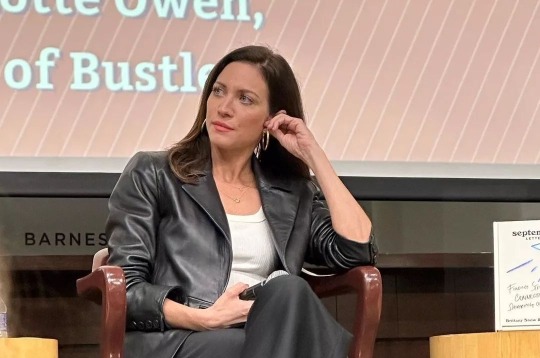
36 notes
·
View notes
Text
May 27
Since there is no Callas anniversary to observe today, I thought I would try to create a timeline for the comings and goings of the curiously complicated Kalogeropoulos family.
1881 (or 1886) – George Kalogeropoulos born
1894 (or 1898) – Evangelia (Litza) Dimitriades born
They married (I don’t know when) and lived in a small town in the Peloponnese where George is a druggist
1917 – daughter Yakinthi (Jackie) born
1920 – son Vassilis born
1922 – Vassilis dies (meningitis)
1923 – George abruptly decides to emigrate to the US; in August the family arrives in New York
December 2 or 3 or 4, 1923 – 2nd daughter born – George calls her Cecilia, Litza calls her Sophie; they settle on Maria Anna Sophie Cecilia; family name is simplified to Kalos (or Callas) (or Calas). She seems to have been called Mary, the name Jackie uses in her book “Sisters”.
December 1936 – Jackie returns to Greece
February 1937 – Litza and Mary (age 13) join Jackie in Athens
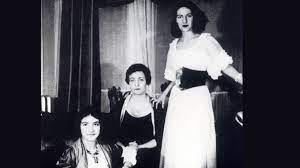
September 1945 – Mary goes to New York
December 24 1946 – Litza arrives back in New York; does NOT reunite with George
June 27, 1947 – Mary (now Maria) arrives in Naples; quickly goes to Verona; two or three days later meets meets Giovanni Battista (“Titta”) Meneghini, age 51
April 1949 – Jackie visits Maria and Titta in Verona; she is taken to be Maria’s younger sister. Maria and Titta marry soon after, and Maria tours to Argentina
May 1950 – Maria visits New York on route to Mexico City; Litza joins her there
Late June 1950 – Maria returns to Italy, Litza to New York; they never meet again
July 1951 – Maria returns to Mexico City; this time George joins her there
At some point Litza went back to Athens, then returned to NY to sue George for support; she wins her case and returns to Athens and he immediately stops payment; she returns to NY and then writes to Maria for help/money and is told to drown herself; Litza reveals the acrimonious letter to the press prior to Maria’s Met debut
1956 – Jackie (then 39) enters the Viotto vocal competition in Vercelli, Italy under the name Elena Montesanto and with a passport doctored to make her younger; she receives encouragement but does not win
Maria and George got together whenever she was in New York. Here is a photo of him greeting Maria at her arrival in 1956 for her Met debut.
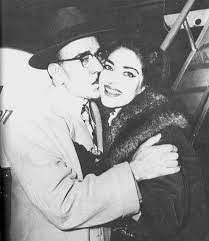
Jackie gives few dates in her book, but at some point there were feelers from Sol Hurok to put her on tour.
Litza in new York works in the costume jewellery store operated by Jolie Gabor, mother of Zsa Zsa and Eva; she also earns money making Maria Callas dolls in various opera costumes (Tosca, Norma, etc)
1959 – Maria leaves Titta for Onassis and joins his highly-publicized peripatetic life
1960 – Litza’s book, “My Daughter, Maria Callas” is published; George (now 79 or 74) moves to Athens
1961 – Jackie finally sees Mary perform – in “Medea” at Epidaurus; she and George meet Onassis
1962 – Litza attempts suicide; her note leaves the income from her book to Maria
1964 – Jackie, on vacation in Italy, visits Titta in Sirmione at the home he shared with Maria; he seems to be still awaiting her return
(At some time in this period George and Litza finally divorce, one of the few times they ever agreed on anything)
1964 – George returns to the US for medical treatment requiring a 4-month hospital stay (thanks to his previous work he has US medical coverage)
1965 – George remarries, returns to Athens; Litza applies for welfare in NY and authorities there seize $200/month from Maria’s US earnings; Litza moves to Athens where Jackie finds her a querulous burden;
December 1972 – George dies; Maria cites her involvement in recording sessions as her reason for not attending the funeral (it was her last recording session and the results were never finished or approved by her). John Ardoin was able to listen to it and stated “It would make a stone weep.”
1975 – After Onassis died Mary resumes contact with Jackie, phoning often and sending money (major surprise)
September 1977 – Maria dies, thus the start of the sad saga of her estate. Jackie goes to Paris for the funeral
August 1982 – Litza dies in Athens; Jackie buries her with George
Jackie, now 65, still takes voice lessons in Athens. At her teacher’s she meets a Dr. Andreas Stathopoulos; they marry in December, 1982
Soon after that they visit London and she meets Robert Sutherland, Maria’s coach/accompanist from 1973/74. He writes: “I met a charming, handsome woman who looked more delicately feminine than Maria, but had a way of moving, speaking and expressing herself which was uncannily like her.” She produced a tape from her handbag of a concert she had given and she wanted his opinion. Sutherland’s heart sank and started to think of tactful things to say. BUT: “Here was a big voice of unusual timbre and character, not always entirely controlled, but certainly material of professional promise.”
Jackie died March 3, 2004
2 notes
·
View notes
Text
An Evening With Neil Gaiman
So I saw @neil-gaiman two nights ago. I'd like to write about it before the memory fades too much. To any fans of his who stumbled upon this blog because they searched for him, I’m sorry for what I’m going to say next.
And if you happen to be Neil Gaiman himself, well, no, you’re not. I simply refuse to believe that he would ever read this. But if he does, please don’t draw attention to me. I cannot handle the idea of even a fraction of your blog’s traffic being directed to mine. I’m happy in obscurity.
If you do the math on his tour dates, this means that I was present in the audience when he said this in Columbus, Ohio, because that is where I am.
I do want to point out that I think that what he actually said was "You ARE a people," not "YOU'RE a people," but it's possible that I misheard him. I was sitting pretty far back. I can all but promise you that Neil Gaiman did not see me. He kind of vaguely looked in my direction, but I was in darkness and far away. It happens.
The line got a laugh from the audience. People thought it was pretty funny. I thought it was obnoxious. What had prompted it was a question that had been submitted to him before the show (I myself did not submit any questions, because I didn't see the submission box on my way in, and the friendly employees who helped me find my seat didn't tell me about it) from someone saying that they were worried about their writing. They were worried that they were writing just for them, and not for people. So, Neil Gaiman said "You are a people," and the audience laughed.
But come on, Neil Gaiman. You could've said "You are a person" or "You're part of 'people,'" and it would have meant the same thing. But that wouldn't have gotten a laugh! My gut says that Neil Gaiman wanted that laugh. That far more people thought it was clever and funny than there were people like me who thought, goddammit, Neil Gaiman.
Let me be clear: I paid $90 for the ticket and parking space to be there last night all by myself because Neil Gaiman is my favorite living author. It doesn't mean I love everything he says or writes or does. It means that, on balance, there is more of his stuff that I love than there is of anybody else's.
I don't need to get into what Neil Gaiman works I enjoy. The man's written enough stuff that I suspect most anybody can find something in his body of work to enjoy. Which is great! It's one of his biggest strengths as an author: he can write for anybody, and he does, and he does it very well.
But I recognize that, though I may be a people, I'm a pretty odd people. I don't like his scary stories. Not because they're too scary, but because I usually don't find them compelling or interesting. I don't like his poems, because I don't generally like poems. There are poems I like. There are Neil Gaiman poems I like. I'm speaking in generalizations, and all generalizations are false.
If I'd known a way to do it, I'd have given someone a letter to pass on to Neil Gaiman. I'd printed it out and put it in an envelope which I'd carefully folded in half and placed in my coat pocket. I didn't see a chance to give it to anybody to give to him, and that's for the best. Neil Gaiman does not need to read a letter from me.
I've spoken at length on many occasions over the last two years about how I'm working on a novel myself. The 11-month course I took on First Draft writing ended this month, so I now have a 60,000-word first draft. I have, in that sense, written a book. I have not finished a book. It is not ready to be shared.
I'm trying to register for the next class from the same school, an 8-month Second Draft course that starts in late September. A 4-month gap. Frustrating.
There's also a Third Draft course. I imagine that there will be a similar gap after the Second Draft before that one starts. If that's true, then my book is two years away from being finished. It's depressing. But the years will pass whether I write the book or not, so I may as well write it.
And, though he's not the only reason, Neil Gaiman is part of why I'm sticking with it. He's a kind-hearted person when it comes to encouraging creativity in others, and even a cynical bastard like me appreciates that. I have to write this book, because, as Neil Gaiman says, nobody else is going to write it if I don't. I have to write something that I would want to read. I have to write something that a younger version of myself would have wanted to read. I have to trust in the idea that maybe, someday, somewhere, someone will enjoy this thing that I wrote.
It won't be good. Let's not pretend. Even with three years of instruction from very qualified teachers, it'll be the debut novel of an autistic software developer from Ohio who never took a writing class in school that he didn't absolutely need to take in order to graduate. I used to write for myself, as a hobby, in middle school, but I wasn't very good at it. I used to draw comic books, but I wasn't good at that, either. I didn't know how to get better, and being bad at it for years on end was depressing, and it wasn't paying my bills. So, as I got older, I stopped. I spent twenty years not even trying.
It kind of shows, I worry. I read a lot, or at least I used to, and I've done my best to understand what works and what doesn't.
"You are a people" works, but I'd never write such a thing. It hurts me to write it even here. I just can't handle it.
I'm not good at learning from observation, at least, not this kind of thing. I've done it with programming. I'm good at that. There's a joke in the IT world that the best programmers know where to go to copy from code that's already been written. In writing a program, your code either compiles or it doesn't. There's no compiler that'll look at your code and say "You are a people? Hilarious!" while another one says "No, please write that correctly." In the world of compilers, there is no accounting for taste, because there is no taste.
Now, obviously different programmers have different programming styles, and some are better at it than others. There's a famous story of how Satoru Iwata was able to optimize the code of Pokemon Gold & Silver so well that he was able to cram in an entire second region. He was a hell of a programmer.
I'm not, but I've still got a collection of degrees and certifications saying I know my stuff. There are no certification exams for writing novels, though, to my knowledge. No standard multiple-choice questions that have right and wrong answers. You just write, and you hope people like it.
As Neil Gaiman pointed out after the "you are a people" line, he wrote for himself, and, though he thinks that he is far from the usual person when it comes to what he does and doesn't enjoy, his taste still resonated with enough people to fill... and then he kind of gestured with his arms at the space in front of him... an entire room. In OHIO. He put emphasis on the word "Ohio." I'm sure he meant that as a joke, too. He was right about that one. That one was a good joke. I liked that joke.
Because Neil Gaiman is not from Ohio, though Ohio was happy to have him. The Palace Theatre had a lot of people in it. People who were there to see him.
That'll never happen to me, and I've accepted that. I've worked hard to be a good programmer, for many years, but other people who are smarter than I am and who've worked harder than I have are better at that than I am, too, and that's alright, too.
But my point, and there is a point, here, is that I still fundamentally believe in what Neil Gaiman has said about the importance of creating something that you'd enjoy, or you'd have enjoyed when you were younger, and getting that out into the world, and trusting that it will find an audience, however small.
I will also point out that, while there is no standardized test for writing, there certainly are tests for spelling, grammar, and punctuation. I've done my best to learn those rules, and I sometimes break them when I think it's useful. Like how that last paragraph was one long sentence, and it began with the word "But" even though sentences shouldn't start with "But."
It's all a matter of style, I suppose, and what style you enjoy.
So I'm glad that I went, and, to tell the truth, I was blinking back tears a little bit by the time Neil Gaiman finished answering that question from that person who wanted to know about writing for others vs. writing for themselves, because it was what I needed to hear, even though I've heard variations on it before. Sometimes it's good to hear it again. Sometimes it's good to be reminded.
I stepped out for a bathroom break while he read his story Click-Clack the Rattlebag, which you can read for yourself at https://www.commonlit.org/en/texts/click-clack-the-rattle-bag if you'd like, because I'd already read that story and don't like it much. It's not a bad story; it's just not to my taste. I didn't think it was scary or interesting or compelling, and that's fine. He read it because he asked the audience if he should read something funny or something scary, and when the audience shouted "Scary!", my heart sank. I would have preferred something funny.
I saw a stand selling books when I stepped out of the main hall, and I knew that Neil Gaiman must have pre-signed a bunch of books. He explained it once, somewhere on his blog, that he can't do signings at these events because it would take too long. He linked to a video that showed him signing like a machine, hundreds of books, at an incredible pace, helped by having a person on either side of him so that they could smoothly slide books in front of him and then take them away once they'd been signed.
To be honest, I think that's the right way for him to do things.
So I bought two books, for about $65. One was just for me, but the other was The Neil Gaiman Reader, because I already own most of Neil Gaiman's books in either digital or physical form, but I didn't own that one, and I wanted to have something I could lend to people who weren't already familiar with most of the stories in it. I was. I've already read most of those stories.

Some of them are not very good. Some of them are incredible. One of them is my favorite short story that Neil Gaiman has ever written, and I've quoted it somewhere on this blog, but I won't say which one it was here or anywhere else. That's a secret that's just for me, for now. But it's in there. It's in that book. And Neil Gaiman signed it for me, though he didn't know he was signing it for me, in the same way that he wrote that story for me, though he didn't know he was writing it for me.
He was, though. He wrote it and he put it out into the world for me to find it, and I found it, and it changed me in a way that art has the power to change a person.
And that's all someone like me can hope for, you know? To try to create something and put it out into the world for someone else to find and be changed.
You knew it had to come back to me, right? Of course it did. I'm self-centered that way. I'm not a good writer, and I've got a bad sense of humor, and I don't like most things, and I'm self-centered.
There's more I could write about the Evening with Neil Gaiman, but I should probably wrap it up. This is already quite long. Here are some brief notes.
He read a poem about Batman, in honor of the late Neal Adams, another of my favorite authors, though not my favorite living author, because he is no longer living. Batman is one of my favorite superheroes, and Neil Gaiman's work with the Batman characters is some of my favorite stuff anybody's done with Batman, but that wasn't enough to counter the fact that it was still a poem, and I found it pretty bland. I'm sorry, Neil Gaiman.
The whole event lasted a little under two hours, which felt rather short to me, but it may have been for the best since it meant I was able to get to bed by 11 PM, and I had to get up at 5 AM for work, and so it only cost me an hour or so of sleep, which I made up for the next night.
My therapist, because of course I have one, suggested I use the event as an opportunity to practice my "getting to know people" conversational skills. I laughed in his face and asked him if he really thought groups of people going to an event like that would want a stranger like me jumping into their conversations. Really got in his face about it. Demanded that he tell me what he'd say in that situation to get a group of people to talk to him. He eventually settled on some vague generalities like "Oh, what works do you enjoy?" I tried talking to a few people while in the line outside the Theatre to get in, but once inside, I talked to nobody and nobody talked to me and that's how I expected that to go.
On the way out, an older lady, who could have been 50 or could have been 90, I simply couldn't tell, was waiting at the steps, leaning on a handrail, and she loudly demanded of me as I walked past her, "Won't somebody buy me something to eat?" I might have the wording slightly off; it may have been "Can't anybody," for example, but you get the idea. She shouted it again a few seconds later. I did not give her any money or buy her any food, though I could have. It's possible that she was sincerely unable to buy her own food. That she was having real trouble in her life, the kind of trouble that any one of us is only a few bad days away from having. But it's also possible that she wasn't, and I'm too cynical and hardened by the world to trust in strangers. I'm cruel, in that way, in addition to all of my other problems. That was what capped off the night for me: an old woman angrily shouting at the patrons of the Palace Theatre that surely one of us rich assholes had money to spare for her, and they should give it to her, and I was one of the many who chose not to.
Well. So it goes.
2 notes
·
View notes
Text
instagram
blackinformationnetwork
For today’s lesson, we’re exploring the significance of the Negro Motorist Green Book, a vital guide for Black travelers during the era of segregation.”
#BINBHM #BlackHistory101
Sidenote: on September 11, 2018(TIFF) and November 16, 2018(United States) Green Book, American biographical comedy-drama film directed by Peter Farrelly premiered in theaters. Starring Viggo Mortensen and Mahershala Ali, the film is inspired by the true story of a 1962 tour of the Deep South by African American pianist Don Shirley and Italian American bouncer and later actor Frank "Tony Lip" Vallelonga, who served as Shirley's driver and bodyguard. Written by Farrelly alongside Lip's son Nick Vallelonga and Brian Hayes Currie, the film is based on interviews with Lip and Shirley, as well as letters Lip wrote to his wife. It is named after The Negro Motorist Green Book, a guide book for African American travelers founded by Victor Hugo Green in 1936 and published until 1966.
Despite criticism of the film perpetuating racial stereotyping by advancing the white savior narrative in film and criticism from Shirley's relatives criticized it because they thought it misrepresented the pianist's relationship with his family and they were not contacted by studio representatives until after development started, the movie was a critical and commercial success garnering praise for the performances of Mortensen and Ali as well as numerous nominations and awards most notably the Academy Award for Best Picture, Best Original Screenplay, and Best Supporting Actor (for Ali)
#Instagram#Mood for every month especially black history month ✊🏾✊🏿✊🏽#blacklivesmatter✊🏽✊🏾✊🏿#black lives matter#blm#black lives fucking matter#black lives movement#all black lives matter#black history month#i’m black
0 notes
Text
Catherine Kullmann The Husband Criteria #RegencyRomance #BlogTour #TheCoffeePotBookClub@CKullmmannauthor @cathiedunn
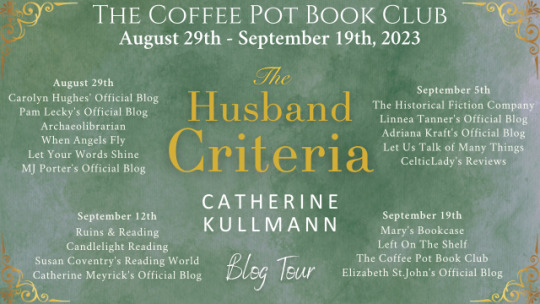
FEATURED AUTHOR: CATHERINE KULLMANN
I am pleased to introduce Catherine Kullmann as the featured author in The Coffee Pot Book Club Blog Tour held between August 29th – September 19th, 2023. Catherine Kullmann is the author of the Regency Romance, The Husband Criteria (The Lorings, Book #3), published by Willow Books on 24th August 2023 (297 pages).
Below are highlights of The Husband Criteria, Catherine Kullmann's author bio, and an excerpt from her book.
Tour Schedule Link: https://thecoffeepotbookclub.blogspot.com/2023/07/blog-tour-husband-criteria-by-catherine-kullmann.html
HIGHLIGHTS: THE HUSBAND CRITERIA
The Husband Criteria
(The Lorings, Book #3)
By Catherine Kullmann
(Blurb)
London 1817
The primary aim of every young lady embarking on the Spring frenzy that is the Season must be to make a good match. Or must it? And what is a good match? For cousins Cynthia, Chloe and Ann, well aware that the society preux chevalier may prove to be a domestic tyrant, these are vital questions. How can they discover their suitors’ true character when all their encounters must be confined to the highly ritualised round of balls, parties and drives in the park?
As they define and refine their Husband Criteria, Cynthia finds herself unwillingly attracted to aloof Rafe Marfield, heir to an earldom, while Chloe is pleased to find that Thomas Musgrave, the vicar’s son from home, is also in London. And Ann must decide what is more important to her, music or marriage.
And what of the gentlemen who consider the marriage mart to be their hunting grounds? How will they react if they realise how rigorously they are being assessed?
A light-hearted, entertaining look behind the scenes of a Season that takes a different course with unexpected consequences for all concerned.
Buy Links:
Universal Link: https://mybook.to/criteria
Amazon UK: https://www.amazon.co.uk/dp/B0CBKZCBVX
Amazon US: https://www.amazon.com/dp/B0CBKZCBVX
Amazon CA: https://www.amazon.ca/dp/B0CBKZCBVX
Amazon AU: https://www.amazon.com.au/dp/B0CBKZCBVX
AUTHOR BIO: CATHERINE KULLMANN
Catherine Kullmann was born and educated in Dublin. Following a three-year courtship conducted mostly by letter, she moved to Germany where she lived for twenty-five years before returning to Ireland. She has worked in the Irish and New Zealand public services and in the private sector. Widowed, she has three adult sons and two grandchildren.
Catherine has always been interested in the extended Regency period, a time when the foundations of our modern world were laid. She loves writing and is particularly interested in what happens after the first happy end—how life goes on for the protagonists and sometimes catches up with them. Her books are set against a background of the offstage, Napoleonic wars and consider in particular the situation of women trapped in a patriarchal society.
She is the author of The Murmur of Masks, Perception & Illusion, A Suggestion of Scandal, The Duke’s Regret, The Potential for Love, A Comfortable Alliance, and Lady Loring’s Dilemma.
Catherine also blogs about historical facts and trivia related to this era. You can find out more about her books and read her blog (My Scrap Album) at her website. You can contact her via her Facebook page or on Twitter.
Author Links:
Website: http://www.catherinekullmann.com
Twitter: https://twitter.com/CKullmannAuthor
Facebook: https://www.facebook.com/catherinekullmannauthor
Book Bub: https://www.bookbub.com/authors/catherine-kullmann
Amazon Author Page: http://viewauthor.at/ckullmannamazonpage
Goodreads: https://www.goodreads.com/author/show/15549457.Catherine_Kullmann
EXCERPT: THE HUSBAND CRITERIA
Chapter Eleven
Cynthia had been intent on their discussion but now she saw that they were being subjected a great deal of covert glances from the assembled ton. She smiled at Chloe who sat in the barouche-landau with Rosa opposite old Lady Loring and Lord Swanmere. They had drawn up beside another carriage containing another old lady and Lady Benton. Chloe said something and all heads turned towards Marfield’s curricle. The lady beside Lady Benton beckoned imperiously.
Marfield groaned. “My grandmother, the dowager Marchioness of Martinborough. She who will not be gainsaid. I cannot pull up beside them; would you object to our drawing in here at the side and walking the few steps back to them? Tom will stay with the horses.”
“No, of course not.” In fact, Cynthia would have preferred not to be presented in such a public manner, but she could not refuse. She sat quietly, admiring the skill with which he eased his equipage into what seemed a very tight space indeed. He jumped down and came round to assist her alight, then offered her his arm and led her through a gap in the rails that separated the lawn from the carriages and horses jostling on the ride.
“You know my mother, of course,” he said as they walked back to the Martinborough carriage.
“I have had the pleasure of meeting Lady Benton several times,” Cynthia agreed. She was relieved to see that the Swanmere carriage had moved on.
Marfield stopped beside the barouche and bowed. “Good day, Grandmother, Mother. Grandmother, may I have the honour of presenting Miss Glazebrook?”
“Good day, my ladies.” Cynthia sketched a curtsey—anything more would be too extravagant here in the Park.
“Of course I know Miss Glazebrook,” Lady Benton said with a friendly smile. “I am happy to see you again, my dear.”
Her mother inclined her head a scant inch. She must be at least as old as Great-Grandmamma, Cynthia thought, noting the dowager’s sharp eyes and wrinkled face surmounted by a pile of carefully arranged silver curls protected by a green silk calash bonnet lined with pale pink and tied with green and pink ribbons. She clutched an ornate lorgnette, which was aimed balefully at the newcomers.
“Don’t just stand there, giving me a crick in my neck,” she snapped, gesturing to the seat opposite her. “Sit down. You too, Marfield.”
Cynthia felt rather than heard him sigh.
“Just for five minutes,” he said as he handed her up. “I cannot keep the horses standing for longer than that.”
“You gentlemen—your horses are always more important to you than anyone else. Why have you not called on me?”
“I was not aware that you were in town, ma’am. When did you come up?”
“Yesterday,” the dowager retorted.
Cynthia bit her lip to repress her smile.
Lady Martinborough turned her magnified gaze on Cynthia. “Glazebrook. Are you related to the Nabob Glazebrook?”
“He is my grandfather, ma’am.”
“Hmm. And your mother? Who are her people?”
“She was Miss Raven.”
“Raven? Ransford’s daughter.”
“Yes, ma’am.”
The dowager snorted but before she could say anymore, Marfield intervened. “Enough, Grandmother. You will put me to the blush if you subject Miss Glazebrook to any further inquisition.”
“It would take more than that to put you to the blush, you scapegrace. Don’t you agree, Miss Glazebrook?”
“Now how am I to answer that?” Cynthia said. “Reluctant as I must be to contradict a lady of such advanced years and standing, you cannot expect me to agree with your characterisation of your grandson; I have always found him most gentleman-like.”
“Well said, Miss Glazebrook,” Lady Benton said. “I should like to talk more, but we mustn’t keep the horses standing any longer.” She held her hand out to Cynthia. “Goodbye, my dear. Pray come and call on me.”
Cynthia touched the proffered fingers. “Thank you, ma’am.”
Marfield rose. “We’ll take our leave of you, ladies.” He hopped down and held his hand out to Cynthia.
She placed hers in it, made a half-bow and with a polite “My ladies”, gratefully stepped down onto the lawn.
Another bow and a wave, and they were able to depart.
“Ooof!” Marfield let out a long breath. “I am so sorry; I had no idea she would go for you like that.”
“I was beginning to wonder would she demand to see my teeth and run a hand down my calf,” Cynthia said.
“You handled her very well. I liked your reference to her advanced years and standing. She couldn’t really take umbrage at being called old in that manner.”
“Thank you for drawing her fire. Still, there is one thing we may be grateful for.”
“And that is?”
“You saw the carriage that was drawn up beside hers earlier? Lady Swan-Loring and Miss Loring were in it.”
“Yes?”
“The old lady sitting opposite them was my great-grandmother, Lady Loring. Just imagine if they were still there when we reached your grandmother.”
“Good heavens! It would have been lorgnettes at dawn, you think?”
“It is very likely.”
© Catherine Kullmann 2023
Instagram Handle: @thecoffeepotbookclub
Read the full article
0 notes